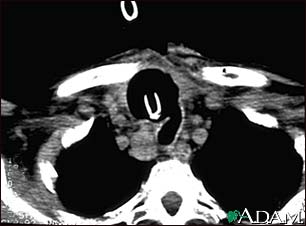Treatment
This type of cancer is treated with surgery to remove the tumor, or radiation therapy, or both. Surgery may require placement of a tube in the throat to help breathing (tracheostomy).

This tumor does not respond to radioactive iodine, which is used to treat other types of thyroid cancer. It usually is not responsive to chemotherapy, either. For some patients, enrolling in a clinical trial of new thyroid cancer treatments may be an option.
Support Groups
The stress of illness can often be eased by joining a support group of people sharing common experiences and problems. See cancer – support group.
Prognosis (Expectations)
The prognosis of this disease is poor. Less than 5% of patients survive 5 years. Most people do not survive longer than 6 months.
Complications
* Spread of tumor within the neck
* Metastasis (spread) of cancer to other body tissues or organs
Calling Your Health Care Provider
Call your health care provider if there is a persistent lump or mass in the neck, hoarseness, changing voice, cough, or coughing up blood.
Anaplastic thyroid cancer: Overview, Causes
Anaplastic thyroid cancer: Symptoms & Signs, Diagnosis & Tests
Anaplastic thyroid cancer: Treatment
Reviewed By : Deborah Wexler, MD, Assistant Professor of Medicine, Harvard Medical School, Endocrinologist, Massachusetts General Hospital. Also reviewed by David Zieve, MD, MHA, Medical Director, A.D.A.M., Inc.
